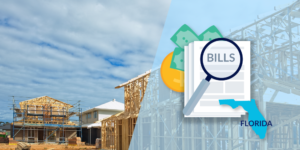
Now that 2020 is finally behind us, it’s time to look towards 2021. For Florida contractors, that means tracking any potential changes to the law that may affect their businesses and rights to payment.
To help you prepare for any potential changes, here’s a quick breakdown of a few recently proposed bills that are currently making their way through Florida’s Legislature that contractors should keep an eye on in 2021.
Construction prompt payment laws
One bill to keep an eye on would make some changes to the current Florida Prompt Payment laws — particularly the rate at which interest will accrue on late payments, and other potential penalties for violating the prompt payment requirements.
You can read the full text of SB 378 here. If the law is passed, these changes will go into effect on July 1, 2021.
Interest on late payments
The most significant of these proposed changes is the increase in the rate of interest that accrues on late payments. These changes would apply to both public and private projects.
On public projects, the interest rate would increase from 1% to 2% per month. Similarly, the rate for late payment on private projects will also increase by 1% if there’s no rate set out in the contract.
In Florida, late payments accrue interest at the rate set out by the contract, or the rate set by the Florida CFO. So, if enacted, the rate of interest will be the same statutory rate (whatever it is at the time) plus 1%.
Other penalties for failure to pay
The other major change this bill would make is to the potential criminal liabilities for failure to comply with the prompt payment provisions on both public and private projects.
If this bill becomes law, any person, firm, or corporation who “knowingly or intentionally” fails to make undisputed payments according to the prompt payment laws can be convicted of misapplication of construction funds; which is a felony offense.
Florida contractor licensing requirements & penalties
There’s also a fair number of proposed laws regarding contractor licensing rules, requirements, and penalties for performing contractor work without a license.
Read a breakdown of Florida’s current licensing requirements
Penalties for unlicensed contracting
One of the bills proposed would enhance the penalties for performing contractor work without a license. You can read the full text of SB 332 here. If passed, these changes will go into effect on October 1, 2021.
Florida takes contractor licensing very seriously. Currently, unlicensed contractors can’t file a construction lien, nor can they enforce any contract executed without a license. On top of that, it’s also a crime to perform or advertise contractor work without a license where one is required.
For now, a first offense is considered a misdemeanor, and the severity increases with each subsequent violation. However, under SB 332, the penalties for unlicensed contractor work will be based on the total amount of the contract.
Here’s a breakdown:
- For contracts of $1,000 or less, a violation will be a first-degree misdemeanor, punishable by fines up to $1,000 and imprisonment up to one year.
- For contracts more than $1,000 but less than $20,000, a violation will be a third-degree felony, punishable by fines up to $5,000 and imprisonment up to five years.
- For contracts more than $20,000 but less than $200,000, a violation will be a second-degree felony, punishable by fines up to $10,000 and imprisonment up to 15 years.
- For contracts over $200,000, a violation will be a first-degree felony, punishable by fines up to $10,000 and imprisonment up to 30 years.
Local specialty contractor licensing
Another bill of interest would eliminate any local licensing rules not required by the Florida DPBR. You can read the full text of SB 268 here and, if passed, it will prohibit any new local licensing requirements by July 1, 2021 and eliminate any existing local licensing requirements by July 1, 2023.
Under the proposed legislation, local licensing requirements for trades such as painting, flooring, cabinetry, interior modeling, etc., will be prohibited — with a few exceptions. Under the exceptions, local municipalities can still have their own journeyman plumbing, pipe fitting, mechanical, and HVAC licensing requirements.
Licensing requirements for certain pool and spa work
Lastly, regarding contractor licenses, there’s one more potential law that’s worth noting. This bill would reduce the licensing requirements for specific pool and/or spa work. You can read the full text of SB 338 here and, if passed, it would go into effect on July 1, 2021.
If enacted, some unlicensed individuals would be allowed to perform certain types of pool and spa work, as long as an individual who is licensed to perform such work is supervising. The type of work includes the “construction, remodeling, repair, or improvement of commercial or residential swimming pools, hot tubs or spas, or interactive water features as defined in the Florida Building Code.”
Furthermore, such supervision will not require a contract between the person performing the work and the supervising licensed contractor.
These are just a few bills that we’ll be keeping an eye on as they progress through the Florida Legislature. We’ll provide any updates if they are enacted.
Special thanks to Jason Lambert of Dinsmore & Shohl LLP for putting these bills on our radar.